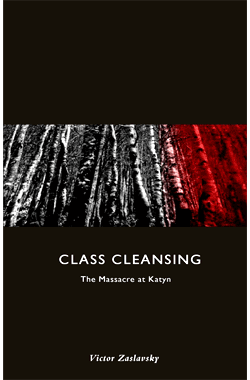In the following conversation with Bill Tullius, Victor Zaslavsky discusses some of the political and historiographical issues raised by his research into the Katyn massacre. Zaslavsky’s Class Cleansing: The Massacre at Katyn, published by Telos Press Publishing, is available here.

Bill Tullius: Your book has highlighted important aspects of the ways in which the process of historical research has been subjected to ideological and political concerns and deceptions. As a result the public at large has long been kept more or less in the dark about such events as the massacre of some 25,000 Polish nationals at Katyn at the hands of the highest officials of the Soviet Union while the crimes of the Nazi regime have long been well known. How does this fact affect the way in which scholars and students alike are to engage in and trust the historiological process from now on?
Victor Zaslavsky: The case of the Katyn massacre is not the first and not the last example of the falsification of the historical truth, even if probably one of the most blatant ones. The first task of any historian remains the establishing of the factual truth. In the words of Leopold von Ranke, establishing “what actually happened.” Boris Pasternak said it differently, criticizing Soviet official writers: “their inability to find and tell the truth cannot be compensated by their skill in telling lies.” Young researchers should trust that in a democratic society the historical truth will sooner or later be discovered.
Tullius: You have shown how those scholars who previously questioned the “official version” of the Katyn massacre were accused of downplaying the crimes of the Nazis. How does the revelation of Soviet responsibility for the Katyn massacre impact the way in which we view both the histories of Nazi Germany and of Soviet Russia and the crimes of both regimes?
Zaslavsky: Katyn’s relevance for the comparative study of such events as war crimes and ethnic and class cleansings—mass murders that are euphemistically called humanitarian crises—is undeniable. One of the typical characteristics of such crimes often has been a massive effort on the part of murderers to obfuscate the historical truth, to blame the victims, and to persecute the witnesses. Contemporary historians who now try to draw some useful lessons from the Katyn experience should ponder the tragic fate of some of the members of the International Medical Commission, who already in 1943 had delivered a clear guilty verdict against the Soviets but later were subjected to intense political pressure and repression. The truth about the Katyn massacre confirms the comparability of Hitler’s and Stalin’s totalitarian regimes. Already, Hannah Arendt had pointed out that, despite all the obvious differences between Nazism and Stalinism in terms of their origins, their actual policies, and their visions of a future perfect society, there exists a level of analysis at which similarities and common features become more significant than any differences. The close German-Soviet collaboration between 1939 and 1941 was by no means a coincidence; rather, it was grounded in their struggle against a common enemy, liberal democracy, their common interest in a division of Europe, and in the structural affinities between the two regimes.
Tullius: You distinguished between the terms “ethnic cleansing” and “class cleansing,” both of which were coined in the twentieth century in answer to what were new and horrifying phenomena of the various types of mass murder carried out in the course of the past century. What marks the difference between the two terms and what about the twentieth century made these new phenomena possible?
Zaslavsky: From the outset, both regimes pursued the goal of eliminating not only their political opponents but entire social classes or ethnic groups regarded as “objective enemies” or “enemies of the people” on the basis of their social or ethnic origins and condemned by reason of their very existence. Mass terror based on the notion of cleansing society of foreign and deleterious elements constitutes the common denominator of the Nazi and Soviet regimes. I can only repeat: just as Auschwitz became the epitome of “ethnic cleansing,” so the Katyn massacre can serve as the epitome of “class cleansing.”
Tullius: In your introduction you note the fact that the official Soviet documents on Katyn detailing the actual events of the massacre, which were finally made public with the fall of the Soviet Union, have been once again deemed “classified” under the former President Vladimir Putin. What does this move to once again silence the truth suggest to us about the current political climate in the Russian Federation and its ties to the Soviet past?
Zaslavsky: Very disturbing news has recently arrived from Russia. In May 2009, a “Commission to Counteract Attempts at Falsifying History to Damage the Interests of Russia” was created. No concrete examples of the falsification of history have yet been provided, but there are official invitations to the institutions of the Academy of Sciences to organize “collection and analysis of information on the falsification of historical facts and events, directed at minimizing the prestige of the Russian Federation.” Particular attention is to be paid to the presentation of World War II and its results. Historians and journalists accused of falsifying history to damage the interests of Russia could be sent to prison. The 28-strong commission is dominated by the military, including the Chief of the General Staff, members of the Parliament, the Kremlin administration, and secret services, with a token representation of two historians. As Moscow observers have already noted, the irony of the situation is that up to now the worst falsifiers of history by far have been Russian and Soviet authorities. It is easy to imagine that books such as Class Cleansing might be blacklisted, as has already been done to Wajda’s famous film Katyn, which has not been shown in Russia.








